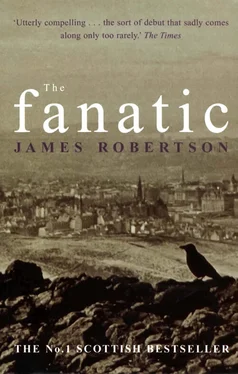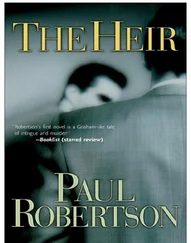The Fanatic
James Robertson
for Ange
In that same year 1670 was that monster of men and reproach of mankind (for otherwayes I cannot stile him), Major Weir, for most horrible witchcraft, Incest, Bestiality, and other enorme crymes, at first contest by himselfe (his conscience being awakned by the terrors of the Almightie), but afterwards faintly denied by him, brunt. So sad a spectacle he was of humane frailty that I think no history can parallell the like. We saw him the fornoon before he died, but he could be drawen to no sense of a mercifull God, so horribly was he lost to himselfe. The thing that aggravated his guilt most was the pretext and show of godlinesse wt which he had even to that tyme deceived the world. His sister also was but a very lamentable object … She was hanged.
— Journals of Sir John Lauder, Lord Fountainhall, with his observations on public affairs and other memoranda 1665–1676
This is the world’s old age; it is declining; albeit it seems a fine and beautiful thing in the eyes of them that know no better, and unto those who are of yesterday and know nothing it looks as if it had been created yesterday, yet the truth is, and a believer knows, it is near the grave.
— From a sermon by Hugh Binning (1627–53), minister of Govan
The wild heads of the tyme do dream,
There’s a world in the moon,
O, to deceive if I were trier,
For heir will trust me none.
— Lines from a satirical poem on Archbishop James Sharp, c.1667, Analecta Scotica
Cover
Title Page
Copyright
Dedication
Epigraph
Prologue (Bass Rock, March 1677)
Edinburgh, April 1997
Linlithgow, September 1645
Edinburgh, April 1997
Edinburgh, September 1656
Edinburgh, April 1997
Edinburgh, April 1677
Edinburgh, April 1997/October 1987
Bass Rock, April 1677/Edinburgh, December 1666
Edinburgh, April 1997
Rotterdam, January 1667
Edinburgh, April 1997/July 1668
Edinburgh, February 1670
Edinburgh, April 1997
Bass Rock, April 1677/Kippen, November 1673
Edinburgh, April 1997
Bass Rock, June 1677/Edinburgh, April 1670
Edinburgh, April 1997
Edinburgh, January 1676
Bass Rock, July 1677
Edinburgh, April 1997
Edinburgh, September 1677
Edinburgh, 12 April 1670
Edinburgh, 1 May 1997
Edinburgh, 1 May 1997/January 1678
Edinburgh, 10, 11 January 1678
Edinburgh, 1 May 1997
Edinburgh, May 1997
Edinburgh, 2 May 1997
Portobello, 2 May 1997
A Historical Note and Acknowledgements
About the Author
About the Publisher
Prologue
(Bass Rock, March 1677)
James Mitchel was dreaming. The kind of dream that mocks, constantly slipping in doubts: this is real, this is not real.
In the dream he was awake and lying in bed. The room was heavy and warm with the smell of woman. A great sadness was welling up in him. He lay there in the growing light and felt the sadness rise from the pit of his belly, a physical thing, spreading through his chest and to his throat till he thought he would have to cry out. But he didn’t; he didn’t want to wake her. Elizabeth. Aye, it was her right enough, he could hear her regular breathing. He heard his own breath, the air passing against the hair of his nostrils, a sound that was of him and yet not of him. Like the sound of your voice when you put your fingers in your lugs. Like the sound of the sea in a shell.
The dawn squeezed into the room. He reached out for Lizzie, and felt cold stone. Suddenly he felt fully, really awake. He turned his head and she wasn’t there. He knew then that they would never touch again. My beloved put in his hand by the hole of the door, and my bowels were moved for him. He wanted to scream or just to greet quietly but the constriction in his throat prevented it, would only allow a whimper.
He was lying in a tiny, damp cell that smelt of salt and urine. Daylight inched its dwaiblie way in and gave up. His bed was a wooden shelf hard up against the stone. He was alone. His right leg oozed pain.
He fell away again. Now he dreamt a face staring at him, evil, a bishop’s face sneering and cold beneath its black skull-cap. Mitchel stared back, refusing to flinch. But then there was another figure, darker and larger, wearing a hood with holes cut for the eyes. The figure reached for him, almost tenderly; lifted his right leg at the ankle, and laid it out straight as if streeking a corpse. Mitchel clamped his teeth together. He was seated in a chair, his arms bound behind him, his leg boxed like a planted sapling. The hooded man turned away, then back again. He was holding an iron-headed mallet in one hand, and a wooden wedge in the other.
The leg convulsed and Mitchel woke again. He sat upright. Through the wall he could hear a man reading from the Psalms: O my God, my soul is cast down within me; therefore will I remember thee from the land of Jordan. Deep calleth unto deep at the noise of thy waterspouts: all thy waves and thy billows are gone over me. Yet the Lord will command his loving kindness in the daytime, and in the night his song shall be with me, and my prayer unto the God of my life …
Mitchel minded where he was.
He was Maister James Mitchel, MA, preacher, tutor, soldier and sword of Christ, prisoner of the King. His enemies called him by a different set of names: fanatic, enthusiastical villain, disaffected rebel, assassin. He had been tortured to extract a confession for a crime he did not consider a crime, an act committed in the service of Christ. His wife Elizabeth was fifteen miles away in Edinburgh. He was incarcerated in the stinking prison of the Bass Rock off the east coast of Scotland, and he did not expect ever to be free again.
He shared the Rock with half a dozen others, also of the godly party, but they would hardly speak to him. Some thought him foolish, wrong-headed, ignorant; and some among them blamed him for having enraged the government and brought its wrath upon their heads. He had been in the Bass nearly two months and if he did not remain till he died it would only be because he had been fetched back to Edinburgh for execution.
His leg was a thrawn limb, in more ways than one. Under the torture of the ‘boots’ it had been so mangled and crushed that it was now not much more than an encumbrance. Even more than a year later he could put little weight upon it. The external injuries had healed, after a fashion, but it remained mere pulp within. It might as well have been missing altogether for all the use it was, and yet it refused to let him be. The pulsing and throbbing might start at any time in the day or night, and cease just as suddenly. It was like having a dog gripped onto him, a sleeping dog that woke hungry from time to time and gnawed at him as if meat and marrow were all he was.
Nine strokes of the mallet he had suffered. The number was hammered into his brain like iron studs in an oak door. He would wake sweating in the night from a dream of himself crushed into a coffin, unable to move, while some demonic servitor, having transported him thus like a living dead man, chapped nine dirling blows at the gates of Hell. Even though Mitchel knew that he was destined not for that place but for Heaven, the memory drove spikes of fire through his ruined leg.
It was ironic that the man who had caused his suffering, the man in the black skull-cap, had not even been present at the torture. James Sharp, Archbishop of St Andrews, had been in London at the time, but Mitchel did not absolve him on that score. Nobody was loathed by an entire people as Sharp was. The minister of Crail who had been so strong, apparently, in defence of Scotland’s Covenant with God; who had been sent by the Kirk to negotiate with King Charles in the year of his Restoration to the throne, and ensure the maintenance of Presbyterianism; who had gone to London to put down bishops and come back an archbishop … Judas Sharp, traitor of traitors. At Mitchel’s torture, some of those on the committee of counsellors and judges appointed to interrogate him had hidden their faces from him when he was brought before them in the vaulted room below the Parliament house in Edinburgh. They feared reprisals if his sympathisers got word of who they were, or they were conscious of their own guilt, or both. To Mitchel, Sharp was no more absent from the laich chamber than those other men were made invisible by covering their eyes. It might just as well have been St Andrews himself, and not the public executioner, hammering the wedges home.
Читать дальше












